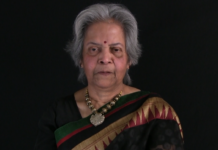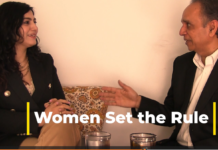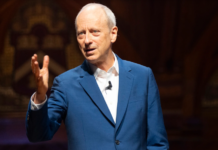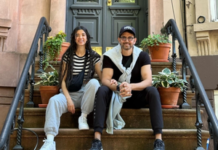By Geetha Patil and Bijoy Misra
LEXINGTON, MA–Over dozen South Asian poets sang and read mother’s voice at their winter poetry reading session at Lexington Public Library in Lexington, MA. The event was organized on March2 5 by South Asia Poets of New England, known as SAPNE.
“And so everywhere I see, the young and the old,
black eyes, blue eyes, green eyes or gray,
red hair, white hair, black hair or gray,
ebony colored, caramel colored or ivory
I saw a common mould.
For I saw my own in every child for every child is mine!”
Srabonti Bandyopadhyay expressed the mother’s view along with fifteen otherss who assembled for the quarterly meet of SAPNE. The expressiveness was to search how mothers view the world and how the view is expressed in literature. Topics ranging from motherly love, compassion, friendship to equanimity and peace were arranged in poets’ words in an event entitled “Voice of the Mothers and the Youth.” The cold drizzles outside converted themselves to the warm motherly shower of sentimental blessings inside!
Nena Wahi opened the meeting with a tribute to the mothers who gave birth to the martyrs in the world. ग़ुलामी की जंजीरों में जकड़ी भारत माता के दर्द को मह्सूस करने वाले शहीद याद और नमन के सच्चे अधिकारी हैं – “The martyrs feel the pain of Mother India and deserve our humble respects!” She called on not to let the Martyr’s Day be a day of remembrance, but a day of action for dignity and justice.
Ipsita Nanda painted the mother as a “Pillar of Strength.” The poem narrated the courage of mothers’ in rearing children amidst challenges. Motherhood demands strength and love. A mother places the child as her utmost priority. A mother herself, she declared that mothers are strong inside even though they may not appear so!
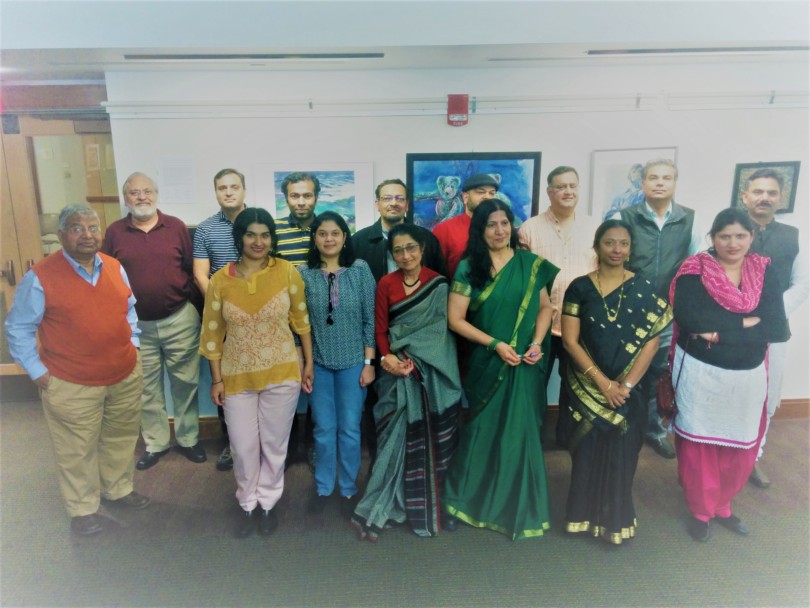 Bijoy Misra excerpted Kaushalaya’s blessings to Rama from Valmiki’s Ramayana. He translated the thoughts from sections from Chapter 25 of Book II (Ayodhya Kanda) into English. The moving Sanskrit lines (Ramayana, Ayodhyakanda, Chapter 25) were rendered by Srilakshmi Srinivasan who had played the role of Kaushalya in a Valmiki play last year. A section of the translation entitled “O’ My Son, My Dear Friend!” read:
Bijoy Misra excerpted Kaushalaya’s blessings to Rama from Valmiki’s Ramayana. He translated the thoughts from sections from Chapter 25 of Book II (Ayodhya Kanda) into English. The moving Sanskrit lines (Ramayana, Ayodhyakanda, Chapter 25) were rendered by Srilakshmi Srinivasan who had played the role of Kaushalya in a Valmiki play last year. A section of the translation entitled “O’ My Son, My Dear Friend!” read:
I taught you worship, I taught you how to be humble!
Respect all that has virtue, never should you crumble!
Let your weapons protect you, never you get feeble!
Let your service to your parents be a guard on you, in Truth never you fumble!
My son, my dear, O’ my dear friend!
I am with you wherever you are, I’m your friend!
Preetpal Singh recited a poem, “Whoever comes into this world must leave it one day.” The contention of the poem was that we all must die per our time, there is no exception for the rich, or the brave, or the strong or the good. Poet felt that after death no one comes back since the world they go to must be a better world. Life continues through the mother!
Anil Mehrotra read a poem by Urdu poet Jagan Nath Azad. The poem called for positivity in the midst of confusion, chaos and violence. The poet said: कोई ताज़ा ख़्याल दे भगवन, दिल से ग़फ़्लत निकाल दे भगवन |हर तरफ़ अम्न हो, महब्बत हो, कोई ऐसा भी साल दे भगवन || Like a mother would wish, let every negative thought turn into love and compassion!
Geetha Patil recited a poem “Voice of My Mother” that described how much she missed her mother’s voice after her demise. It is impossible to move on from the memory of losing the woman who sacrificed her happiness so that you could have a better one. The mother’s voice has no parallel.
Amit Khare saw the mother from a child’s eye. For a child, the mother is never too far away, her blessings are carried with him. It is the mother who motivates the child in trying times and stands by him with encouragement. The child reciprocates with gratitude and admiration.
Rahul Dutta Sharma recited the legendary poem माँ एक कहानी by the late poet Maithilisharan Gupta. Gautam Buddha’s wife teaches her son Rahul about the ways of justice in the world by teaching the childhood story in Buddha’s life when he protected a wounded bird. The mother teaches, “You decide, my boy, how would you judge an event!”
Sanjeev Tripathi paid tribute to India through his poem “Pehechan Hindustan ki (Indian identity).” The culture of the motherland follows a person wherever he or she may live. The poem called on people never to forget the land of origin and align with the tasks and issues with the old country and families.
Srilakshmi Srinivasan sang a song composed by her that praised the unparalleled love offered by mothers. The song glorified the universal mother for her valiant indulgence in the perpetuation of the universe. The poet asked the mother goddess to shower her blessings to bring in mother’s love into every living thing on earth: Kanna thaliki Saate Lethu.
Swapna Ray conjured up memories of my departed mother. In the poem, “I am Looking for You”, the poet recalled her mother voice that she would be with her in the foreign land. Mothers console us to move forward, but we miss their presence as we progress in time.
Rahul Ray sang a famous marching song of Muktibahini, the revolutionary brigade in Bengal. The lyric by Mohini Choudhury depicted the contribution of Indian national liberation revolutionaries who sacrificed their lives at the altar of Indian Freedom. The song salutes the martyrs who rose to the occasion to inspire millions of Indians to call for freedom.
Maneesh Srivastav read two Hindi poem प्यार की परिभाषा (Definition of Love) and पिता (Father). For some love is necessity, jealousy, youth and sex. For some love is about giving, sacrifice, friendship and affection. प्यार का अपना आसमां है, प्यार माँ है. Love is the mother. The second poem was in memory of the poet’s father.
Prem Nagar presented a poem entitled वेद क्या है (what are the Vedas). With their ancestry unknown, the Vedas encompass religion, philosophy and humanity, but above all, a sense of expression. Vedic language is a synthesis of many local vernacular languages that creates a new way of expression of words with in-built meanings.
Janmejay Shishupal read his poem आज भी जारी है (It prevails even today). The poem remembered the martyr in India’s struggle for freedom. People’s struggle is not over and continues till today. Many are hungry, homeless and utterly poor. Mother’s love is needed!
Bijoy Misra thanked all participants and the colleagues who helped in organizing the program. The meeting ended with coffee and social interchange.
The next meeting of SAPNE would be the Annual India Poetry Reading at Harvard University. The date would be Sunday, May 14, 2017. The theme for the afternoon was set as “Truth”. Please contact Bijoy Misra at misra.bijoy@gmail.com or Chandu Shah at chandu420@gmail.com for participation.




